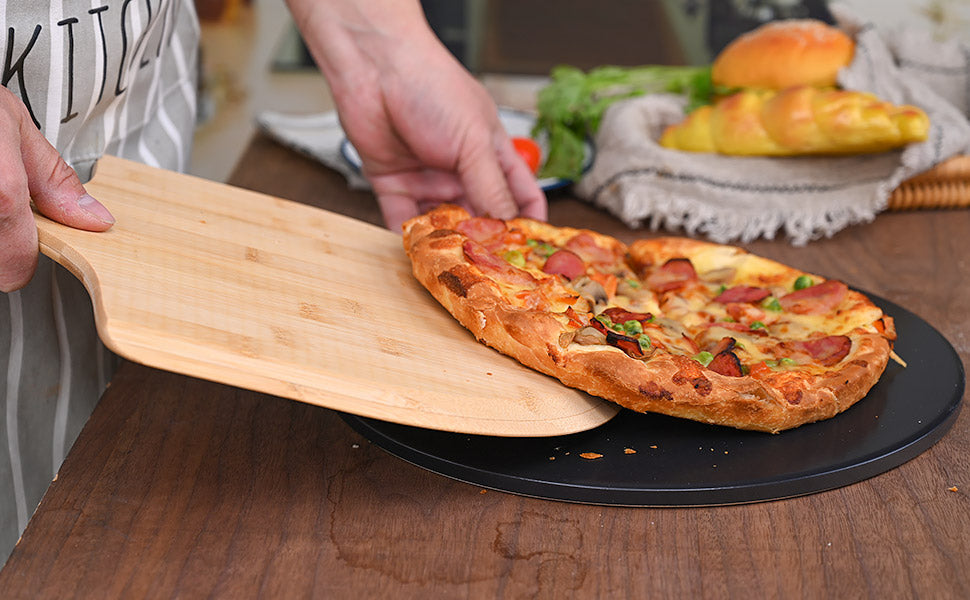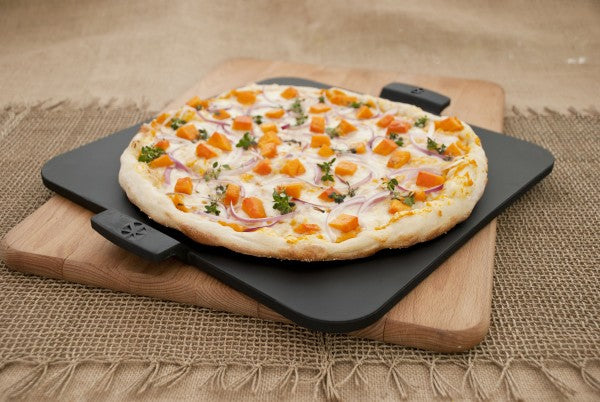When it comes to achieving the perfect pizza crust, kitchen professionals are often faced with the dilemma of choosing between a baking stone vs pizza pan. Each offers unique benefits and can influence the final product in different ways. Let's dive into the details to help you make an informed decision.

Understanding the Basics of a Baking Stone
A baking stone is a portable cooking surface used in baking. It's a popular tool among skilled bakers and professional chefs due to its ability to absorb moisture and distribute heat evenly. The porous nature of the stone allows it to create a crispy, well-browned crust that is highly sought after in artisanal pizzas and breads. Plus, a baking stone is incredibly versatile. It can be used to bake a variety of foods beyond pizza, enhancing their texture and taste. For more creative uses, learn what else your pizza stone is good for.
Exploring the Pizza Pan
On the other hand, a pizza pan is often made of metal, ranging from aluminum to stainless steel. It usually comes with a non-stick coating to assist with easy removal of the pizza. Pizza pans can come perforated or solid, with the perforated pans allowing for better airflow and a crisper crust. However, unlike the baking stone, a pizza pan cannot absorb moisture from the dough, which may result in a chewier crust.
Comparative Analysis: Baking Stone vs Pizza Pan
To choose between a baking stone vs pizza pan, consider these factors:
1. Heat Retention and Distribution
A baking stone excels in retaining and evenly distributing heat, mimicking the conditions of a brick oven. This results in consistent textures and delightful crusts. In contrast, a metal pizza pan tends to heat up quickly but doesn't provide the same level of heat retention, which might lead to uneven cooking if not carefully monitored.
2. Versatility
While both tools serve the main function of baking pizzas, a baking stone's versatility extends beyond pizzas to pastries, breads, and even roasting vegetables. For further exploration on topics like seasoning cast iron, visit seasoning cast iron articles.
3. Maintenance and Durability
In terms of maintenance, baking stones require more care, needing to be cleaned without detergent and stored properly to avoid cracking. They also take time to preheat. Pizza pans, being less fragile and typically dishwasher safe, offer convenience but may not last as long as a well-cared-for stone, especially under heavy use.
Making Your Decision
Ultimately, the decision between a baking stone vs pizza pan should align with your cooking habits, the desired outcome, and the level of care you're willing to provide. If professional-grade pizzas with a crisp crust are your goal, investing in a quality baking stone would be wise. Should you prioritize convenience and ease of use, then a pizza pan might be preferable.
:max_bytes(150000):strip_icc()/pizza-stone-testing-winners-lodge-pre-seasoned-cast-iron-baking-pan-wdickey-3-02-a8dc06f53f5d4be89d55a499294de19b.jpg)
FAQ
1. Can I use a baking stone with any type of oven?
Yes, baking stones can be used in both traditional and convection ovens. Ensure that the stone fits comfortably in your oven and allow plenty of time for it to preheat for optimal results.
2. Will my pizza stick to the pan if I don't use oil?
If your pizza pan is non-stick, you can often forgo oiling. However, it's advisable to use a slight dusting of flour or cornmeal to prevent sticking, especially if your pan doesn't have a non-stick coating.
3. How do I clean my baking stone?
Baking stones require gentle cleaning. Avoid using soap; instead, scrape off food residue with a brush or plastic scraper and rinse with water if necessary.
For additional cooking tips like baking on stone, explore our comprehensive resources.
This article contains affiliate links. We may earn a commission at no extra cost to you.





Leave a comment
This site is protected by hCaptcha and the hCaptcha Privacy Policy and Terms of Service apply.